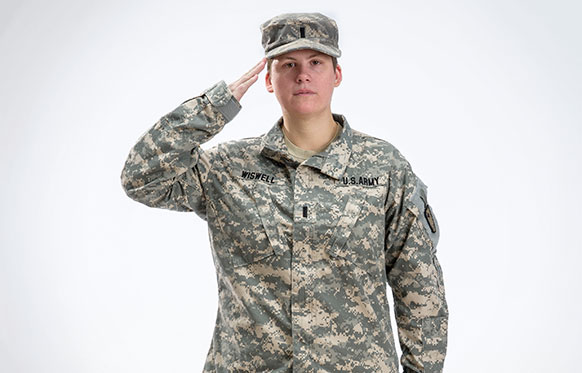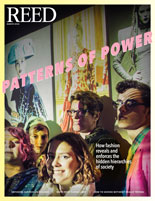
IRIS login | Reed College home Volume 95, No. 1: March 2016
Life Beyond Reed
Nicole Wiswell ’02 (continued)

Photo by Jamey Guy
Engineer Officer/Platoon Leader, U.S. Army
Nicole always dreamed of serving her country, but the old policy of “don’t ask, don’t tell,” barred gays and lesbians from serving openly in the military. So she came to Reed and majored in religion. After graduation, she worked in a residential treatment center before switching gears and studying law at the University of Minnesota. Then she got a part-time gig at Apple showing people how to use their computers that turned into a full-time job training Apple employees. When “don’t ask, don’t tell” was finally repealed, she signed up for the National Guard, where she is now a lieutenant leading a platoon of vertical engineers.
Thesis: Recreation, Race, and Lynching: Toward a New Theory in the Study of Southern Religion. Advisor: Prof. Arthur McCalla [religion 1999-2005].
How would you describe yourself? I’m just your average liberal, queer, feminist Quaker who also happens to be an Army officer.
Why did you choose to major in religion? Having been exposed to math and physics—the immutable laws of nature—I was interested in the man-made laws, belief systems, and orders. Like law, religion is an ordering system in people’s lives.
What is a vertical engineer? Vertical engineers are the builders. My unit builds hospitals, schools, and helicopter pads. When the Dakotas have flooding, we help shore up the riverbanks. I spent six months in the Ozarks learning everything engineers do from demolition and route clearance to formulas for calculating how much tonnage a bridge can handle. It’s a lot of math, but it’s fun.
Isn’t military service an unusual choice for a Reedie? The U.S. has always had a weird relationship with its citizens who are in the military. On one hand they’re revered as heroes, the people who defend freedom—whatever that means—and yet they’re seen as apart. My dad was a doctor in the army for 25 years and as a kid I wanted to go to West Point and be a soldier, or maybe an astronaut. Some of our first conversations in Hum 110 were about civic responsibility and the citizen-soldier in Plato’s ideal city. Serving in the military is one way to protect the ideals you believe in.
What career advice do you have for Reedies? Be open to whatever is out there. Don’t worry if the first two—or seven—things you do after college aren’t what you thought you’d be doing. It doesn’t have to be your dream job—just find value in it and see how you develop as a person. That night job at a treatment center might give you the time to write the great American novel, apply to grad schools, or study for law exams.

LATEST COMMENTS
steve-jobs-1976 I knew Steve Jobs when he was on the second floor of Quincy. (Fall...
Utnapishtim - 2 weeks ago
Prof. Mason Drukman [political science 1964–70] This is gold, pure gold. God bless, Prof. Drukman.
puredog - 1 month ago
virginia-davis-1965 Such a good friend & compatriot in the day of Satyricon...
czarchasm - 4 months ago
John Peara Baba 1990 John died of a broken heart from losing his mom and then his...
kodachrome - 7 months ago
Carol Sawyer 1962 Who wrote this obit? I'm writing something about Carol Sawyer...
MsLaurie Pepper - 8 months ago
William W. Wissman MAT 1969 ...and THREE sisters. Sabra, the oldest, Mary, the middle, and...
riclf - 10 months ago